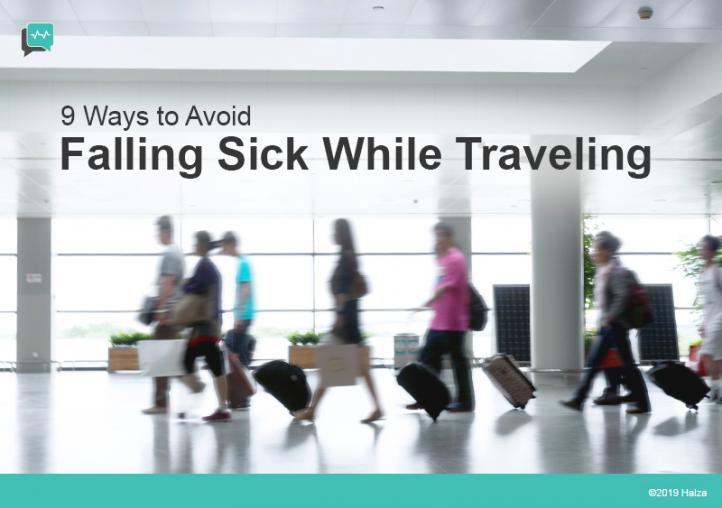9 Ways to Avoid Falling Sick While Traveling

Falling sick is part of everyday life. Traveling exposes your body to whole new range of viruses and climate conditions. A strong immune system is essential in keeping you healthy, but it can’t be built overnight. Tips on good hygiene can help but your chances of getting sick increases if your immune system is weak.
You can lower your chances of falling ill by preparing in advance ways to combat the risks, especially in places prone to the spread of infectious diseases. Here are some preventive measures you can take before and during your trip.

BEFORE TRAVELING
1) Eat and rest well
Eating the right foods is essential to a healthy immune system. Sticking to a high protein diet of lean meat, fish, tofu, legumes, and beans will help the body fight off viral and bacterial infections.
Citrus fruits such as grapefruits, oranges and tangerines are good options to keep healthy. Most citrus fruits are loaded with vitamin C that is key in warding off infections. Include 1 serving daily as your body doesn’t produce or store any of it.
Also, make sure to get at least 8 hours of sleep each night. Sleep deprivation can weaken the immune system.

2) Get the appropriate vaccinations
Prevention is always better than cure. Not all vaccinations are required for every individual and trip, though a lot depends on the vaccinations you already have, your medical history, the countries you visit and what sort of activities you have planned. Hence, it’s best to consult your local doctor before packing your bags.
ON THE FLIGHT

3) Sanitize contaminated items on flights
Canadian Broadcasting Corporation (CBC) news revealed in 2018 that the dirtiest surface on airplanes was the headrest, followed by items like the seat pocket, washroom handle, tray table, and seat belt. Mold, bacteria, and harmful pathogens that can cause intestinal infections were detected in these places.
Remember to wipe down contaminated surfaces with a sanitizer.

4) Only consume drinks from a bottle
Think twice before ordering an inflight beverage like coffee or tea as these drinks come straight from the designated water tank. Water tanks on both short and long-haul flights are potential breeding grounds for pathogens like coliform and E. coli bacteria.
Ideally, the beverages you consume should come from a bottle to avoid falling sick.
5) Avoid pillows and blankets from airplanes
Pillows and blankets from airplanes may host germs like Aspergillus niger that cause pneumonia and other infections. The cleanliness of these items depends on the hygiene practices of differing airlines, the course of flight, and if the items have been contaminated before.
Do not assume your blanket is new just because it is sealed in plastic. One tip is to pack a sweater. If you’re still cold, ask for a blanket but maybe not bury your face in it. It would also be safer to bring a travel pillow for comfort than to use those belonging to the airline.
Your comfort should not come at the cost of your health.
AT YOUR DESTINATION
6) Sanitize items in hotel rooms
One way to avoid falling sick is to sanitize fixtures prone to contamination. High levels of fecal bacteria, Coliform, along with other generic bacteria were found on items such as bedside lamps and remote controls in hotel rooms.
7) Take extra precaution in crowded areas
The most common kind of illnesses people catch from crowds is respiratory related, which consists of the common cold, influenza, sinus infection, or bronchitis.
The spread of viruses in crowded places is heightened during flu season, often beginning in October with peaks in December to February, ending in late May.
When in crowds, remember to keep a safe distance so as to stay clear of any fluids expelled from the sick. Flu contaminated droplets don’t spread beyond 6 feet from the infected person.

8) Clean your hands frequently
Your hands are the most consistent point of contact with contaminated objects. The simple act of washing them with warm water and soap is a great defense against the spread of harmful microorganisms.
As the main portal of entry for viral infections is the T-zone of the face, the nose, eyes, and mouth, make sure that your hands are always clean and refrain from touching this area to avoid falling sick.
Restrooms are home to fecal bacteria. One tip is to carry tiny bottles of hand sanitizer with at least 60% alcohol to reduce your trips to the restroom. If you do use a public toilet, remember to use a clean paper towel to push the door handle open when leaving the restroom.

9) Staying hydrated throughout the trip to avoid falling sick
Drinking plenty of water helps soothe the dehydrating effects of air travel, which can lead to headaches, stomach cramps, and fatigue. Nasal mists are also effective in lubricating and keeping the protective mucous membranes active and working. Avoid diuretics like caffeine or alcohol which cause dehydration.
Ultimately, water is your best traveling companion. Drink enough water before and throughout your trip as it is essential in flushing out the toxins accumulated in your body that compromises your immune system.
Start working to build a healthy immune system today. Follow these steps before and during your trip and most importantly have fun on your travels!
How Halza helps
Be prepared for any medical emergency as you travel with the Halza app. Have your medical data including all x-rays, scans, vaccination records, and medication prescriptions always with you. Use QuickShare to provide a complete overview of your health records with any doctor during an emergency or incident in seconds. As Halza comes in 26 languages, you are covered globally!
Download Halza today!
Sources: UCI Health – WHO, 2 – Healthline – Livescience – Healthhub – Cedars-Sinai – NSF – CBC – Researchgate – Sciencedaily – BravoTV